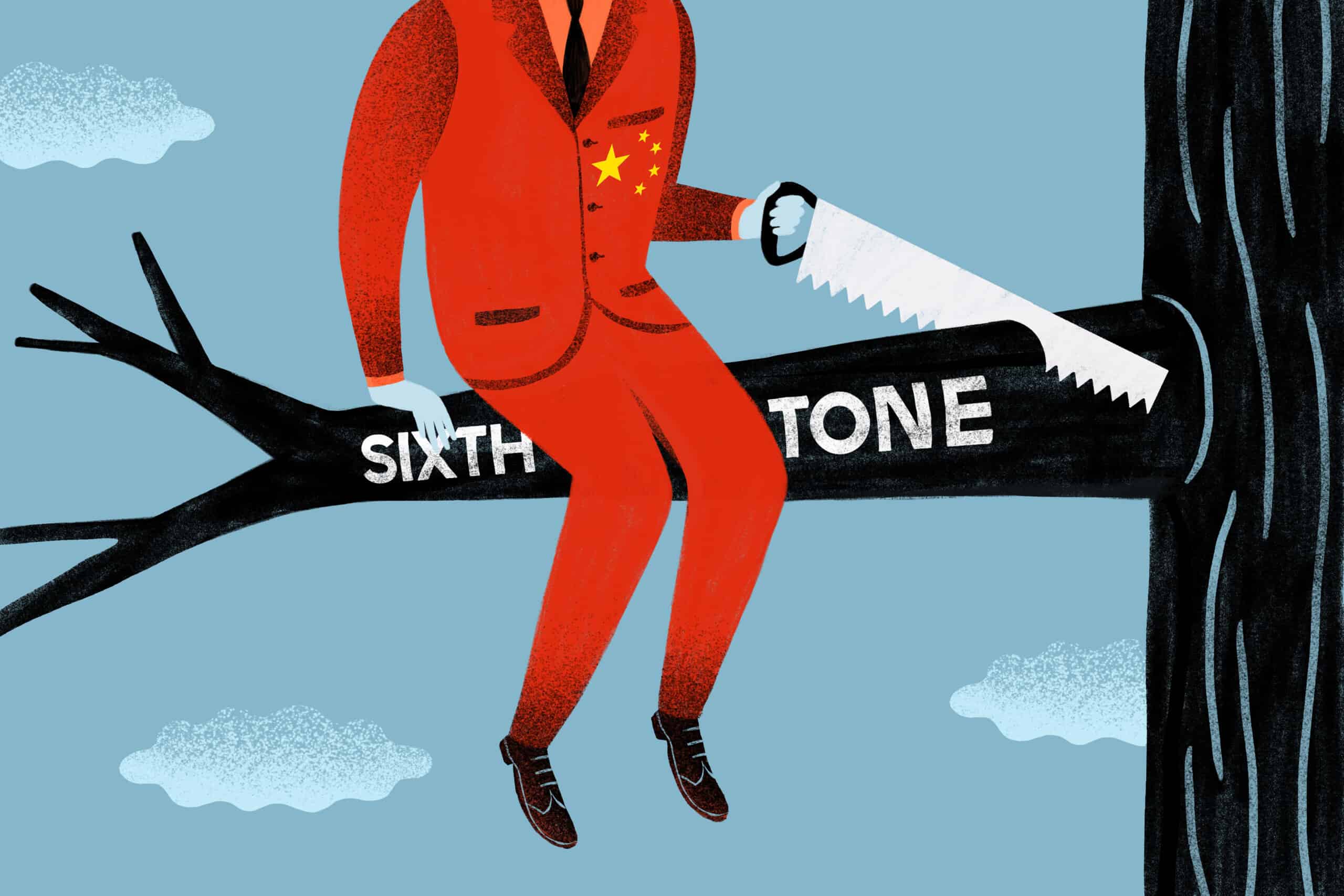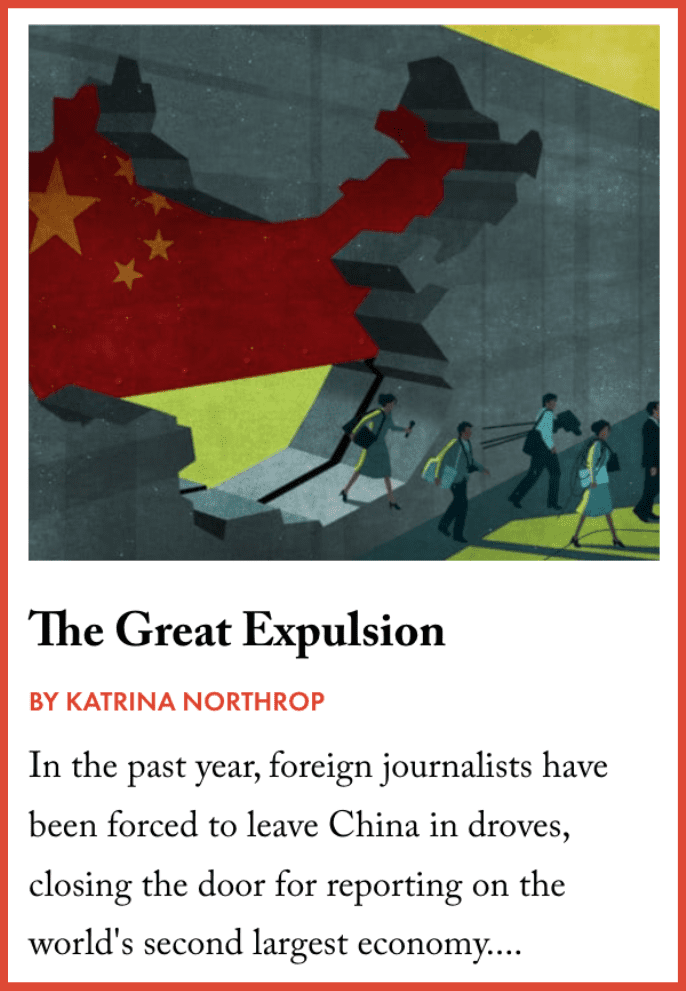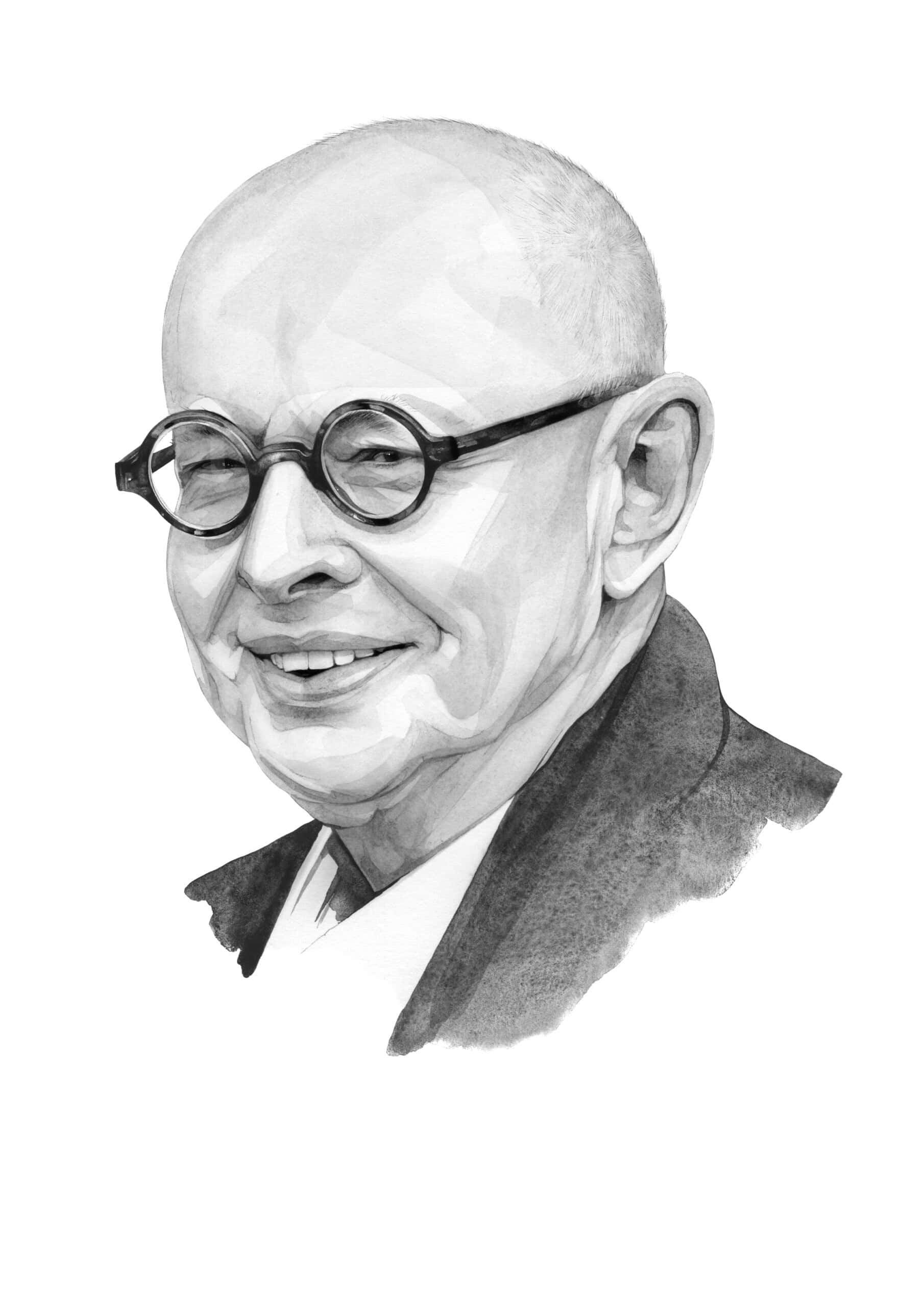
Bibek Bhandari was on holiday at home in Nepal for the first time in two years when he received an ominous text message from his manager at Sixth Tone, an English-language online publication in China. “Things are getting serious,” it said.

Several weeks before, on one of the last days of December 2022, the Shanghai-based outlet had run a year-end review, reflecting on the year’s biggest headlines. There were highlights, such as the Winter Olympics in Beijing, but overall, it was a tough year for China. Bhandari, Sixth Tone’s head of news at the time, had mostly selected buzzwords like “baby bust,” “housing crisis,” “gender violence,” “climate catastrophe,” and “COVID” to represent the year.
There was hardly anything new in the piece, but it caught the attention of jingoistic bloggers who found the depiction unfairly negative. In a Weibo post, Yu Liang, former editor-in-chief of the ultranationalist outlet Guancha, compared Sixth Tone’s coverage to that of The New York Times and BBC. “We have a CNN among our ranks,” a reader wrote in the comments.
Sixth Tone took the piece down shortly after Yu’s post made the rounds, but the damage was done. “I was told the project enraged certain people in Beijing — our criticism of the ‘zero-COVID’ policy had crossed the line,” Bhandari recalled on Twitter.
Sixth Tone is state-owned, but this was not the first time it had run into trouble with authorities. In 2017, the outlet published a photo essay of Uyghur life in Langan village, in southern Xinjiang, capturing the early signs of China’s repression of ethnic minorities in the region. After it was shared by Uyghur rights groups overseas, Sixth Tone was ordered to delete all stories about Xinjiang, regardless of whether they were related to human rights. In 2019, after a series of articles on migrant relocation, the outlet’s commentaries desk was suspended for a month. In most cases of perceived overreach, senior editors would write apology letters and the publication would lay low until things blew over.



Left: Men gathered in Xinjiang. Center: Students hold the Chinese flag in Kashgar, October 27, 2014. Right: Right: A Uyghur vendor in Ostagboyi Koqisi, October 30, 2014. Credit: Sun Junbin/Sixth Tone via the International Uyghur Human Rights & Democracy Foundation


Left: Members of the neighborhood patrol in Kashgar’s Duolaitebage Township, October 29, 2014. Right: Villagers attend a lecture about ‘eliminating religious extremism through dress’ at a cultural plaza in Kashgar, November 4, 2015. Credit: Sun Junbin/Sixth Tone via the International Uyghur Human Rights & Democracy Foundation
This time was different. The repercussions of Bhandari’s year-in-review piece were swift and severe. The editor-in-chief took on a reduced role and a managing editor was demoted. Bhandari submitted his resignation upon his return in early March. And in the ensuing months, the Shanghai United Media Group, the state media company that owns Sixth Tone, overhauled its management, marking the end of a unique experiment in China’s media industry.
In retrospect, Sixth Tone’s days were always numbered. Founded in 2016 to fill the gap between foreign press and traditional state media coverage, Sixth Tone had long fought a battle on two fronts: foreign readers greeted it with skepticism due to its state affiliation, while nationalists in the country attacked its content for liberal leanings. But for many, both inside and outside of China, it offered something invaluable amid growing constraints: a rare space for on-the-ground perspectives in China.

“We encouraged our reporters to go deeper into the country and gather the stories of people who are often underrepresented in the English-speaking world,” Wei Xing, co-founder and the first editor-in-chief of Sixth Tone, told The Wire China. “So that more voices could be heard.”
These voices included a male sex worker and father from Inner Mongolia, a chengguan (city management official) who spent 18 years chasing vendors off the streets, and a woman on a desperate search for her missing husband after a flash flood at a subway station killed 14 people in Zhengzhou. (The deaths could have been avoided if city authorities had taken swift action, another Sixth Tone investigation found.)
Because Sixth Tone is published in English, it often covered topics that were deemed off-limits for most Chinese state outlets. And for six years, it succeeded in carving out a precarious, but unique space in China’s media ecosystem. But The Wire’s conversations with 15 former and current employees reveal how the publication has been neutered over the past year. Under new management, censorship ramped up, and top editors trawled through the archive, removing articles and tweaking lines that might trigger anger in Beijing and its loyalists. Pitches about social issues, such as the demographic crisis, are now rebuffed, and the newsroom was ordered to churn out at least one positive story a week about Shanghai starting in February.
Sixth Tone was able to write about China as a place where real people live and care about their future, as opposed to an abstraction, or a rival nation, or a site to do business, or a series of social and economic problems.
Qian Jinghua, who joined Sixth Tone as a reporter and later became its head of news
“Every quote of a story is examined to determine if it aligns with core socialist values,” a current employee laments.
Sixth Tone reporters were also subjected to a performance indicator system that ties their pay — $13,500 a year for most entry level reporters — to their output. Writers earn 3 points for a short writeup, for instance, and 10 points for a news article. Failure to meet the minimum target of 60 points results in a warning in the first month, followed by a deduction in basic salary, which some believe effectively deters writers from pursuing sensitive stories that might not pass the censors.
Sixth Tone did not respond to requests for comment.
“Sixth Tone went from being one of the most open and progressive Chinese state media to the most restricted in the last few months, even beyond the likes of Global Times or Shanghai Daily,” says a second current employee.
Indeed, the outlet was founded to tell “uncommon stories of common people,” but a new editorial policy in place since September confines reporters to stories that project “the image of a lovable China.” The strategy, several observers note, is bound to backfire as it takes aim not only at critical stories, but human ones too.
CHINA’S STORY
The irony of Sixth Tone’s demise is how well the publication was serving Xi Jinping’s 2013 exhortation to the media to “tell China’s story well.”
Towards the end of the Hu Jintao era, China had already clamped down on the crusading journalism of the decade before. But Xi decided to go on the offensive. Media is a major battle ground for the “public opinion struggle” and to win the narrative war both domestically and internationally, Xi was convinced the propaganda apparatus needed an upgrade. Just months after taking office, Xi called for “strong, credible and influential” new media groups to inject a burst of energy into the industry.
“One thing Xi Jinping understood was that Chinese propaganda was very bad and soft power initiatives were failing. And an idea came straight from the top that Chinese media should be modern and appealing to the masses,” says Jeremy Goldkorn, an editorial fellow with Asia Society’s ChinaFile.
A CGTN video covering Alibaba’s acquisition of the South China Morning Post Group, December 11, 2015.
Supported by a mix of state funds and private capital, a cohort of digital media startups cropped up across the country. Alibaba acquired the South China Morning Post Group for $266 million in 2015, and traditional state media also tried to turn themselves around: The state broadcaster CCTV, for instance, rebranded its global television channel under CGTN to great fanfare.
But it was The Paper, a slick outlet backed by the Shanghai United Media Group, that became the poster child. In 2014, days before The Paper’s launch, Lu Wei, the director of the newly-formed Cyberspace Administration of China (the internet watchdog), visited The Paper’s Shanghai offices in a sign of support.
“Shanghai invested a lot for it to become the star of this movement,” says Maria Repnikova, an associate professor at Georgia State University.
The Paper, or Pengpai, app went on to record 65 million downloads and 5 million daily active users in its first two years. Its coverage seemed to manage a tricky balance: On one hand, it ran glowing profiles on Xi in a style that appealed to younger readers; on the other, it made a name for itself with its aggressive reporting on political corruption.

“There was always this tension inside: The outlet was a new, more savvy form of propaganda, but at the same time, interests within the publication pushed for credible pieces that really attracted audiences,” says David Bandurski, director of China Media Project, a U.S.-based independent research project that studies the Chinese media landscape.
As The Paper noticed a demand for its stories in English, the idea for Sixth Tone came about. Instead of just translating The Paper’s content, the founding editors wanted the new publication to develop an identity of its own. On a late night before the Lunar New Year in 2016, the co-founding team decided the name of the publication with a vote.
“There are five tones in Mandarin,” Wei explains. “We wanted to provide a fresh, alternative perspective that adds to, instead of replacing, the other voices.”
Many who joined the outlet were driven by journalistic ideals and an opportunity to do something innovative.
“Sixth Tone was able to write about China as a place where real people live and care about their future, as opposed to an abstraction, or a rival nation, or a site to do business, or a series of social and economic problems,” says Qian Jinghua, who joined Sixth Tone as a reporter and later became its head of news.
Still, staff members at Sixth Tone understood they too must straddle a fine line.

“There are moments when a story that we’ve worked on doesn’t get published for whatever reason,” Colum Murphy, Sixth Tone’s first editorial director and a former reporter at The Wall Street Journal, said in 2017. “These are the sensitivities and constraints of working in China.”
Wei recalls communicating with the regulators and how it was never a “confrontational approach.”
“I always tried to explain our perspectives to [the regulators], such as why we picked a certain topic and how we interpreted it,” Wei says. “I’d like to think that a richer, more nuanced coverage of a country would only contribute to its image.”
Although Sixth Tone staff were very aware of the censors, several former employees recall the newsroom operating on the principle of “ask for forgiveness, not permission.”
“We very explicitly tried to cultivate an environment where reporters felt that they could pitch anything and pursue anything that we thought was newsworthy, even if there was a chance of it being killed,” Qian says.

In the early days, there was plenty that was deemed newsworthy: women surviving domestic violence, for instance, or a brothel-turned-nursing home, or even a Kazak lesbian navigating life in China. And Sixth Tone writers executed their stories well: In 2017 alone, Sixth Tone beat out publications like South China Morning Post and Frontier Myanmar to win two awards from the prestigious Society of Publishers in Asia, and it was a finalist in four other categories. (Five out of six articles have since been removed from its site, including one entitled “‘Little Pinkos’ and the Problem of Patriotism in China.”) International media like BBC even started citing Sixth Tone’s reports as a source.
But as Fang Kecheng, a media scholar at the Chinese University of Hong Kong, notes, “A feature of censorship in China is that the more influential you are, the tighter the leash,” and it didn’t take long for Sixth Tone journalists to feel the tug. Notes started coming in about words or sentences Sixth Tone editors had to change, but according to Kevin Schoenmakers, a member of the co-founding team who left in 2018, “It was always possible to negotiate to rephrase it. In rare cases where fundamental changes were requested, we would usually end up not publishing the article. But that became more and more common as time went on.”
I’m haunted by the stories that we haven’t been able to report and those we published but later perished from our website.
a former staff member at Sixth Tone
Around 2017, a hard limit of no more than one LGBT story a month was handed down. At some point, interviews with Greenpeace and mentions of MeToo also became taboo. In 2020, Wu Ting, a former managing editor at The Paper, became editor-in-chief and reporters noticed a more risk-averse approach. Wu began vetting pitches, for instance, or leaning on managers to hire people he deemed likely to toe the Party line. Reporters even began receiving compulsory assignments to cover events in Shanghai, such as trade shows and public forums.

The pandemic, however, brought the issue to a head, with several former journalists describing the censorship process during this time as traumatic. Attempts to report on the wide-spread suffering hit a brick wall, or weeks of work could disappear with a simple order from higher up. As China declared “victory” over the pandemic and was eager to turn the page, even recalling memories of the zero-Covid policy became off-limits.
“I’m haunted by the stories that we haven’t been able to report and those we published but later perished from our website,” says a former staff member.
“When you gloss over the pain and suffering in society in order to sanitize a story, you lose both your readers and credibility,” says another.

After the fallout over Bhandari’s end-of-2022 article, Liu Qi, a former editor at a digital product of Shanghai Daily, was parachuted in with an edict to tighten things further. Two staff members recalled a tense meeting last fall in which she made the message clear: Sixth Tone had changed permanently.
Today, the outlet has about two dozen journalists — half the size of its newsroom at its height in 2017. Some of its most popular articles in recent weeks have been about a doleful Chinese cat that became an online sensation or about an AI-powered game that mimics nosy relatives. Still, the change in editorial direction isn’t always enough to stop criticism: In November, an innocuous Q&A with a scholar on the history of Shanghai drew accusations of advocating separatism. The controversy once again plunged the outlet into crisis with top editors monitoring social media and reporting to authorities every few hours.
Last month, potentially to further appease critics, the outlet started following Beijing’s lead and referred to Tibet by its romanized Chinese name, Xizang.
For journalists, the changes, says Ian Johnson, a veteran China-based journalist who wrote for The Wall Street Journal and The New York Times, have been akin to a frog in boiling water. “You keep thinking, ‘Yeah, that [censorship] is happening, but there’s still this [journalism] happening over here.’ But bit by bit, it gets harder.” The rise of The Paper and Sixth Tone wasn’t exactly a golden age, he says, but to many, it felt like “a small flowering that was allowed to take place.”
GOOD VIBES ONLY

Last month, the Beijing-based website Caixin published the story of a young man who was waterboarded, beaten with PVC pipes, and electric-shocked while detained in Xinjiang and who eventually died in the hospital.1An English translation can be found here: https://blog.feichangdao.com/2024/01/censorship-of-police-torture-and-murder.html
The eight police officers responsible had already been brought to trial and were convicted — each sentenced to between 3 and 13 years in prison — so Caixin’s investigation wasn’t demanding that someone be held accountable so much as it was a heartfelt and meticulous re-telling of this tragic incident, told through the mother’s winding journey to seek justice for her son.
Still, within 24 hours of publication, Caixin’s article was scrubbed from its site as were social media posts that mentioned the victim’s name, Sun Renze. The erasure is indicative of just how little room there is now for Chinese media outlets to report beyond “official notices” from authorities and how averse Beijing is to negative stories — even if they’re not negative about the Chinese Communist Party.
This hostility to “bad vibe” stories, as Carl Minzner, a senior fellow at the Council on Foreign Relations and a professor of Chinese law at Fordham University, calls them, is deeply rooted, stemming from Beijing’s fear of social movements and so-called color revolutions. But by white-washing all human interest stories, Minzner says Chinese citizens become alienated from one another.
“These are journalists who care about their country, care about the society and want to air issues that they think are important,” he says. “But the increased concern over ‘bad news’ means that people in one city don’t have an understanding of what those in another are going through. This was especially true during Covid and the lockdowns.”

Indeed, this past November, the powers-that-be at Sixth Tone were briefly reminded about the connective and even unifying power of journalism after a Huawei executive told an official from the Shanghai United Media Group that their overseas employees really liked Sixth Tone and its content. According to a current employee, the newsroom enjoyed a short reprieve from ultra-strict censorship as a result.
Beijing, notes Repnikova, wasn’t always so fearful. In the past, she says, Beijing actually used the media to “try to understand what people are thinking about, what they’re critical of and to address their concerns.”
The growth of the personality cult [of Xi Jinping] is basically sucking the oxygen out of the system.
Phil Cunningham, author of the China Story newsletter
“It’s why China has been described as a responsive authoritarian state,” adds Fang. “In an authoritarian regime, the media can play the role of reflecting public opinion. But when the channel for public feedback is undermined or has even disappeared completely, it affects the ability to make responsive decision-making.”
Fang notes that, with the changes at Sixth Tone and others, the number of outlets that pursue stories with significant public interest has dwindled to only a handful, with Caixin being one of them. And the effect is obvious: From the floundering macro-economy to failed efforts to boost the population, China’s public policy-making is out of touch with reality.
“The growth of the personality cult [of Xi Jinping] is basically sucking the oxygen out of the system,” says Phil Cunningham, who writes about CCTV’s daily evening broadcast in his newsletter China Story. “More and more time is devoted to puff pieces about the supreme leader and the supreme thinking of the Communist Party. Everything good is attributed to the Party and everything bad is tinged with being somehow connected to the outside world, especially the U.S., the U.K. and Japan.”
Beijing’s growing hostility towards foreign countries has trickled down to affect the foreign press as well, culminating in China’s expulsion of over a dozen reporters, including Johnson, in 2020. While some individuals were allowed to return, access was never fully restored, leaving many mainstream outlets reporting from afar.
“A lot of it has to do with the deteriorating relationship with the U.S. and the feeling that no matter what [Beijing does], they’re not going to get good press. So they’d rather shut the information down than open it up,” says Goldkorn.
The foreign journalists that are left “are under heavy surveillance, they are threatened, they are being followed in the street, and there is constant blackmail on their visa renewal,” says Cedric Alviani, Asia-Pacific bureau director for Reporters Without Borders, which ranked China at the second lowest out of 180 countries in its press freedom index last year.

Fewer sources, be they scholars, businessmen or ordinary people, are willing to even speak to foreign press on the record for fear of being accused of aiding foreign forces — or di daozi (遞刀子), ‘passing the knife’, as it’s known among the public. Foreign correspondents have even been confronted by angry mobs.
“There aren’t formal limitations on travel,” says Johnson, the author of Sparks: China’s Underground Historians and their Battle for the Future. “But for many reporters, they feel like it’s almost not worth it because you can’t go and interview people very easily.”
Sixth Tone could have helped fill this gap in coverage and, with its focus on ordinary Chinese citizens, could have painted a picture for the rest of the world of a China that is nuanced, complicated and beautiful. But “as these channels close down,” says Minzner, “the entire depiction of China flattens and becomes much more negative. That’s actually not in the interest of Party authorities in Beijing.”
Indeed, when coverage flattens so too can empathy.




Stills from Calling Back From Wuhan, a documentary made by two journalists from Sixth Tone. Courtesy of Yang Shenlai and Tang Xiaolan
When the pandemic first broke out, two journalists from Sixth Tone traveled to the epicenter of Wuhan, where they followed a man in and out of the hospital. They put together a poignant documentary, interposing the footage with his phone conversations with his parents (both of whom died from the virus), his wife (who tested positive and struggled with depression), and his relatives (whom he pleaded with to take his daughter in a bid to keep her safe). The film, Calling Back From Wuhan, was censored shortly after publication, but it still won the World Press Photo’s Digital Storytelling Contest in 2021. After coming under government pressure, however, the journalists had to take it down from the site.
By the time China lifted its zero-COVID policy three years later, many foreign outlets, without a single correspondent on the ground, had no means by which to report on the harrowing, exhausting and deeply human experiences of Chinese citizens. Instead, many outlets relied on satellite images of funeral homes and crematoriums — meaning the loss of tens of thousands of families were reduced to dots in a black and white image.

Rachel Cheung is a staff writer for The Wire China based in Hong Kong. She previously worked at VICE World News and South China Morning Post, where she won a SOPA Award for Excellence in Arts and Culture Reporting. Her work has appeared in The Washington Post, Los Angeles Times, Columbia Journalism Review and The Atlantic, among other outlets.




